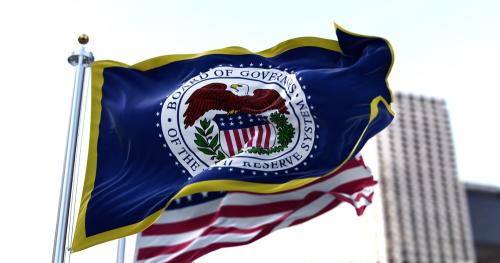“We hold ourselves accountable I think, pretty well,” former Federal Reserve Chair Ben Bernanke said today at a Hutchins Center on Fiscal and Monetary Policy discussion on Fed independence, accountability, and governance in the 21st century. Bernanke, now a distinguished fellow in residence at Brookings, added:
The dual mandate has gotten enormous attention. And we’ve added a lot of transparency in terms of projections [and] in terms of press conferences, and the things that existed already like the Humphrey-Hawkins testimonies. And so the Fed is all about explaining where the economy is, and where they think the economy is going, and what needs to be done to meet those mandates. So I don’t think that Congress has failed to make the Fed accountable on those grounds. What the Congress objects to, I gather, is some of the tools that have been used.
Center Director David Wessel, a senior fellow in Economic Studies, moderated a series of panel discussions during the event, including one on the 12 Federal Reserve banks, and another on the financial stability role of the Federal Reserve. Visit the event’s web page to download presentations by Peter Conti-Brown and Viral Acharya, as well as Conti-Brown’s paper on the 12 Federal Reserve banks.
The third panel consisted of Bernanke, along with Brookings Senior Fellow Sarah Binder, former U.S. Representative Barney Frank, and Ruth Porat, executive VP and CFO of Morgan Stanley and a member of the Hutchins Center’s Advisory Council. Watch videos below of highlights of this portion of the event.
Binder on the “countercyclical” attention Congress has historically paid to the Federal Reserve, and how “intense partisan polarization” is contributing to attention today:
Rep. Frank on what he thinks is the “root of the issue,” namely, that today’s Republican Party has a “vehement objection to the dual mandate” of the Fed, specifically the employment part:
Porat on why Wall Street does care about Fed accountability:
Finally, Bernanke on his objections to the Federal Reserve Accountability and Transparency Act (the FRAT bill):
(Transcript of the above clip follows below)
Logically independence means political independence, and there have been times when Congress was exerting undue influence, and times when the executive was exerting undue influence. And I don’t think from the point of view of giving the Fed the independence to take the necessary actions to achieve its mandate, I don’t think it makes that much difference. I have two objections basically to the [Federal Reserve Accountability and Transparency Act of 2015]. The first is that the presumption that the Taylor Rule is the right rule or the right kind of rule I think is no longer state-of-the-art thinking. …
The Fed has a rule. The Fed’s rule is that we will go for a 2 percent inflation rate. We will go for the natural rate of unemployment. We put equal weight on those two things. We will give you information about our projections about our interest rates. That is a rule and that is a framework that should clarify exactly what the Fed is doing.
My second objection to the bill is I think that while it, in principle, yes, is about the Fed setting its own rule, I think that in practice that it would be used to some extent to constrain policy in ways that would not be correct given the particular exigencies of the moment. So any rule is going to be a problem when the circumstances change in a way that the rule didn’t contemplate.
And if the Fed is always taking actions like that and Congress is pushing back and saying, “No you are violating the rule,” I think that it is–less directly than Audit the Fed—but I think it still is a way in which Congress would assert undue influence on monetary policy.
Visit the event’s web page for complete archived video, audio, and other materials.



Commentary
VIDEO: Experts discuss Congress and oversight of the Federal Reserve
March 2, 2015